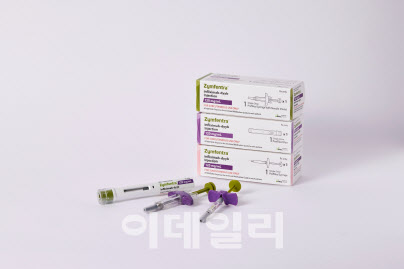Celltrion Confirms Long-Term Safety, Efficacy of Zymfentra
[Kim Saemi, Edaily Reporter] 102-week global Phase 3 extension study published in international journal; supports broader prescribing in U.S.
Celltrion said on 24 April it has confirmed the long-term safety and efficacy of Zymfentra, its subcutaneous formulation of infliximab, following the publication of a global Phase 3 extension study in the Journal of Crohn’s and Colitis.
The study evaluated 102 weeks of maintenance therapy with CT-P13 SC marketed in the United States as Zymfentra for patients with inflammatory bowel disease (IBD). According to Celltrion, the results provide further clinical evidence to support long-term use of the drug, raising expectations for expanded adoption in the U.S. market.
The open-label study included 278 patients with Crohn’s disease and 348 with ulcerative colitis, all of whom received CT-P13 SC. The trial followed a previous 54-week study and evaluated the treatment’s efficacy, safety, and pharmacokinetic and pharmacodynamic profiles.
Patients initially received CT-P13 intravenously for six weeks. Those who responded were randomly assigned at Week 10 to receive either 120 mg of CT-P13 SC or placebo through Week 54. From Week 22, patients needing intensified treatment were allowed to escalate to a 240 mg dose. All patients entering the extension phase continued on CT-P13 SC through Week 102.
Celltrion said the study showed sustained clinical remission, endoscopic response, and no new safety concerns, even among those who received increased dosing.
“With this study, we’ve secured additional evidence supporting the long-term clinical benefit of CT-P13 SC,” a Celltrion official said. “Zymfentra is the only subcutaneous formulation of infliximab that offers improved convenience, making it a compelling option for IBD care in the U.S.”
Celltrion said it plans to expand its market share globally by leveraging its autoimmune portfolio.
|
The study evaluated 102 weeks of maintenance therapy with CT-P13 SC marketed in the United States as Zymfentra for patients with inflammatory bowel disease (IBD). According to Celltrion, the results provide further clinical evidence to support long-term use of the drug, raising expectations for expanded adoption in the U.S. market.
The open-label study included 278 patients with Crohn’s disease and 348 with ulcerative colitis, all of whom received CT-P13 SC. The trial followed a previous 54-week study and evaluated the treatment’s efficacy, safety, and pharmacokinetic and pharmacodynamic profiles.
Patients initially received CT-P13 intravenously for six weeks. Those who responded were randomly assigned at Week 10 to receive either 120 mg of CT-P13 SC or placebo through Week 54. From Week 22, patients needing intensified treatment were allowed to escalate to a 240 mg dose. All patients entering the extension phase continued on CT-P13 SC through Week 102.
Celltrion said the study showed sustained clinical remission, endoscopic response, and no new safety concerns, even among those who received increased dosing.
“With this study, we’ve secured additional evidence supporting the long-term clinical benefit of CT-P13 SC,” a Celltrion official said. “Zymfentra is the only subcutaneous formulation of infliximab that offers improved convenience, making it a compelling option for IBD care in the U.S.”
Celltrion said it plans to expand its market share globally by leveraging its autoimmune portfolio.
김새미 bird@











!['2% 로열티'가 무너뜨린 신뢰…알테오젠發 바이오株 동반 하락[바이오맥짚기]](https://image.edaily.co.kr/images/vision/files/NP/S/2026/01/PS26012201091b.jpg)